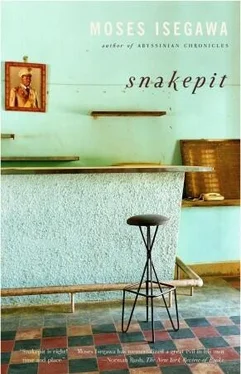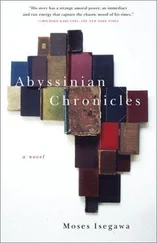As the flames weakened and the fire started to die down, the Pounder knocked Bossman down, tied him with a rope, and threw him into the fire. The man’s screams and grunts mixed with the renewed roaring of the flames fed by fresh fuel. Ashes smiled and continued whistling monotonously. He stayed behind till the fire died down.
General MiG 300 never turned up. Everybody was still afraid of Colonel Robert Ashes.
A FEW DAYS LATER, smugglers awaiting interrogation in police custody near Jinja were freed in a spectacular attack. Armed men swooped onto the police station, disarmed and tied up the guards, released all in custody and told the police chief to send their greetings to Mr. Ashes. Ashes treated it like a joke. He knew that it was most probably General Fart who was responsible. After all, he had never expected him to take the loss of the powerful Anti-Smuggling Unit lying down.
A MONTH LATER, Ashes’ wife’s home was attacked. She lived in Mengo, very near the city centre. The attackers came armed with incendiary grenades and machine guns. They bombed the house till it caught fire. Luckily for the couple, they had gone to the island. Three guards and two servants were killed. Ashes was privately shaken but remained openly defiant. He went about his job as if nothing had happened. He appeared with his wife in public, determined to lead his life to the full. Two losses are not going to knock me out. It comes with the territory, he said to himself. I know who is behind these cowardly acts and I will deal with him in due time.
The government ascribed the attack to guerrillas aiming to destabilize the peace-loving government of Uganda.
In the meantime, Ashes had to deal with the British Embassy, explaining the disappearance of the Bossmans on behalf of the government. He maintained that the Bossmans had absconded with government money and could as yet not be located. He turned the question round and asked the embassy to trace the fugitives and help bring them to justice. Tempers flared, with Ashes outdoing the embassy suits, who had to show diplomatic restraint. He knew well that time was on his side, since like all macabre affairs in a macabre time, the significance of the Bossmans’ case would pale and die quickly in the incessant heat and rain, replaced by more momentous issues, till it fell off the tree of topical issues. Forgotten.
In those days, Ashes spent much time scouring the lake in his speedboat for pleasure or in pursuit of smugglers. He loved the hypnotizing sound of the engine, the soothing winds, the colourful scenery. He often went out fishing. He would bring large fishes ashore, watch the shiny silver bodies flop and flap in final death throes, and help his men build a fire. The smell of the lake, the magic of the trees, the flavour of the fish, would evoke paradise. Wine would be uncorked, liquor would flow, and the impromptu party would branch out in music and dance. Hidden out there, secured by a ton of ammunition, protected by water on all sides, they were like modern-day pirates, dangerous, transient.
On weekends he would fly his wife to the island, take her on boat rides or escort her deep in the forest to look for yellow-legged parrots. They would take skilled men, borrowed from other islands, and watch as they shinned their way up incredibly high trees in search of eggs and young birds.
His wife came from a well-to-do Ugandan family which had gone down when the kingdoms were banned. He had met some of her people, but, with his reputation, it hadn’t been the most successful of encounters. It suited him just fine; after all, he was not looking for an extended family. As long as she loved him— meaning if she stayed devoted, loyal, subservient — he did not care. His major worry was that she did not want to leave the country. She believed that she could always hide in the villages after the fall of the government. Where did that leave him? She had studied in America in the sixties; she had been to Britain for holidays on a number of occasions; she said she had had enough.
“I am too old to live in a foreign land,” she would say firmly.
“But you are only forty, my dear. How can you say that?”
“I am not a nomad by nature, Bob.”
“We can go to Rhodesia.”
“And live among those racist farmers?”
“Or to South Africa. You have never seen such a beautiful country.”
“The blacks will kill you.”
“South America is perfect. Beautiful weather, wine, luxury.”
“Next you are going to suggest the Caribbeans.”
“Yes, nobody gives a damn over there. Nobody will bother you.”
“We will see, Bob,” she would say in a conciliatory tone that did not mean she had changed her mind, “but don’t tell Amin of your travel plans.”
“Are you crazy, woman?”
Ashes had a cageful of parrots. He and his wife enjoyed hearing them curse, sing, whistle. His favourite, a green one with red spots, he had christened General Fart. To entertain his wife, he would dress in a pirate outfit imported from Britain — eyepatch, scarf and all — and play with General Fart.
Sometimes he would look at the lake and momentarily visualize his escape route. He planned to slip away as noiselessly as he had arrived. Did Dr. Ali also prophesy my escape? he would think amusedly.
SISTER FINALLY MANAGED to get away. She cleaned the utensils, scrubbed the floor and closed the house, leaving a message behind for Mafuta. It was with a heavy heart that she began the journey. She felt the burden of leadership slipping onto her shoulders, heavy like lead, hot like a disc saw in action. She was going to have to keep everybody hopeful. As the car took her away from the place she had come to love, it felt as if she would not return. Harder than leaving was keeping the load of secrets gnawing away inside her.
Her brother’s money made her think of Saudi Arabia, a fabled land spouting oil and oozing with billions of dollars. That some of it had found its way into her brother’s pocket could only be good news. She herself would never touch anybody’s money, but she had nothing against people fighting their way out of poverty, as long as they did not take from defenceless people. It struck her again that maybe he was dead. If so, her life would change very quickly; Mafuta’s too. She did not know if she could handle it.
She now realized how wise she had been to resist expensive gifts from him.
“Sister, I have never given you anything of value, something to reflect what you mean to me.”
“I have you. If you are alive, I am rich,” she had replied.
“I know, but unexpressed love and appreciation go mouldy.”
“Not if there is sincerity. Take care of your wife; Mafuta will take care of me. If anything happens to him, I can always turn to you. You are my insurance and that is enough for me.”
“The offer still stands.”
“I appreciate it.”
Bat had looked disappointed.
She arrived safely. People had gathered at her parents’ home. Relatives, friends, strangers. Her brother Tayari had broken the news to them the day before and had forestalled everybody by bringing an astrologer from the city and a bull. He had killed the bull and the astrologer had read the omens, which had been favourable. There was the smell of roasting and cooking meat in the compound as the people regaled themselves on the meat. Some staunch Catholics and Protestants were still offended that an astrologer, an agent of the Devil, had been called in instead of priests. They refused to touch the meat, saying that it was unholy.
Sister was surprised by Tayari’s action; she felt outsmarted. Her friends had suggested consulting an astrologer, but she had not made up her mind. She took her brother aside and asked him what had happened.
“You say that the omens were good.”
Читать дальше











